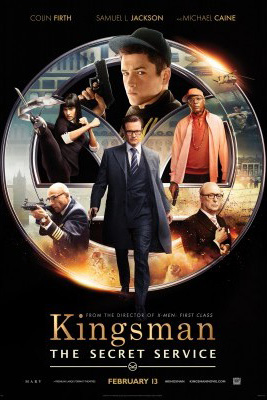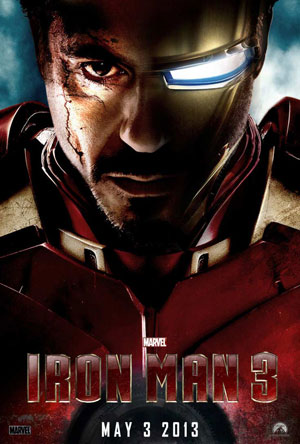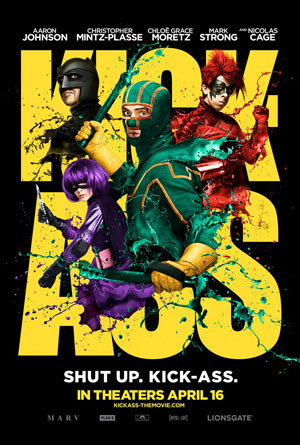PREVIEWSworld Movie Month: An Interview With Mark Millar
Apr 30, 2015
He has given us some of the finest comics to date, including Wanted, Kick-Ass, Starlight, and MPH. Now Mark Millar reveals some inside knowledge of what people think in Hollywoood in this PREVIEWSworld Exclusive interview.
**********
 PREVIEWSworld: Over the past couple of years, comics seem to be the new gold rush for Hollywood. What do you think it is about the comic book medium that has so many people running in the same direction? And why now?
PREVIEWSworld: Over the past couple of years, comics seem to be the new gold rush for Hollywood. What do you think it is about the comic book medium that has so many people running in the same direction? And why now?
Mark Millar: As someone who speaks to Hollywood execs or producers every day I can answer that very simply: comics is just a mine of great ideas. It really is as obvious as it sounds. Look at what's being published every month right now, from Saga to Bitch Planet to Trees to Scott Snyder's Batman, and I can't think of another medium with such a breadth of ideas and energy. Multiply that by seven or eight decades of material and it's actually mind-blowing what comics have achieved. I'm not seeing this kind of diversity or creativity in theatre or crime novels or even television. Comics dominate Hollywood right now because comics are impressive. The men and women who put these books together are so talented that their ideas are crossing over several mediums. It's a wonderful time.
 PREVIEWSworld: When you sit down to write a comic, do you ever think to plot the story using a more concrete visual presentation? Meaning, more of a concentration on storyboarding for a keener focus on scenery, pacing, or plot device. Such an approach from the start would make the story more palatable to a screen adaptation, correct? Or do you think such an approach hamstrings your creativity from the beginning?
PREVIEWSworld: When you sit down to write a comic, do you ever think to plot the story using a more concrete visual presentation? Meaning, more of a concentration on storyboarding for a keener focus on scenery, pacing, or plot device. Such an approach from the start would make the story more palatable to a screen adaptation, correct? Or do you think such an approach hamstrings your creativity from the beginning?
Mark Millar: No offense, but this really is a very silly question. It's probably the thing I'm asked most, and it really makes no sense as a comic can't possibly be engineered to be a movie. A movie is a story told in a hundred and twenty minutes of sound and visual. A comic story or graphic novel is usually around 120 pages of text and visual. Marvels, Kingdom Come, The Dark Knight Returns, Maus, Daredevil: Born Again or even the Kree-Skrull War story in old Avengers comics would all make fantastic movies. They're not created to be more 'palatable as screen adaptations' because these kind of stories didn't really get used in the very rare comic-book adaptations of the periods they were published. They were just terrific, engaging stories. Likewise, the books that get adapted are simply the ones the execs and producers like best. It's that simple. They resonate in a way another story hasn't and there's no formula, or else every story we've ever written would have a movie deal attached and every company would be doing it. Scott Pilgrim, Kick-Ass, 300, Sin City, Kingsman: The Secret Service, Teenage Mutant Ninja Turtles, Watchmen, and Road to Perdition have all made the jump from comics to movies. I think the fact every one of these is so incredibly different proves there's no guaranteed formula of any kind. What they all have in common is that they were created by people who loved doing the comics and that love is contagious. Hollywood people fell in love with them too. That to me is the real secret.
 PREVIEWSworld: If a comic is to be attractive for a screen adaptation (big or small), what elements about a story do you think producers find most attractive? In your opinion, what “sells” a comic the most for a screen adaptation? Or is this question impossible to answer because it depends on an individual’s taste, or gut instinct? Or does it depend more on “what’s hot in the market”?
PREVIEWSworld: If a comic is to be attractive for a screen adaptation (big or small), what elements about a story do you think producers find most attractive? In your opinion, what “sells” a comic the most for a screen adaptation? Or is this question impossible to answer because it depends on an individual’s taste, or gut instinct? Or does it depend more on “what’s hot in the market”?
Mark Millar: There is no collective taste, no Hollywood hive-mind, or all the very varied books I mentioned above would never have been translated to the screen. Each of these books were generally adapted by something that resonated with them. It might have been seeing Richard Nixon in a superhero comic. It might have been Scott Pilgrim fighting the evil ex-boyfriends. “Hot in the market” means nothing to Hollywood either.
I guarantee that comic-book sales don't even enter into the equation and Iron Man is a perfect example. It's consistently sold around half what Spidey sells for a decade and is only one title, but Iron Man now makes twice what Spider-Man grosses internationally in movie terms. Likewise, the Blade franchise has grossed over a billion dollars in cinemas, but hasn't sustained a series for more than a year or two in the character's history. But they're great, compelling characters and attractive to actors and film-makers. Tony Stark is a wonderful movie character and is up there with Han Solo and James Bond now.
PREVIEWSworld: Explain to us what some of your biggest concerns are for your property when someone buys it for TV or film treatments. How do you relay those concerns? What’s the nature of those conversations? How do you go about saying what you do and don’t want to happen?
 Mark Millar: I think I can figure people out reasonably well, and the trick for me is just to choose people I like and respect. Again, it's so simple and it's not fool-proof. Nobody sets out to make a bad movie. People always have the best of intentions. But before you give the movie rights to something you own to someone, you really need to look at their body of work as opposed to their hotness within the Hollywood system. So many terrible directors have been offered to me on the promise that the buzz around their upcoming movie is incredible, but the work is all you need to know.
Mark Millar: I think I can figure people out reasonably well, and the trick for me is just to choose people I like and respect. Again, it's so simple and it's not fool-proof. Nobody sets out to make a bad movie. People always have the best of intentions. But before you give the movie rights to something you own to someone, you really need to look at their body of work as opposed to their hotness within the Hollywood system. So many terrible directors have been offered to me on the promise that the buzz around their upcoming movie is incredible, but the work is all you need to know.
If someone has done three movies you don't like there's an excellent chance you're not going to like their adaptation of your book. So you have to kill it. Creator-owned means you can say no and protect your work, which is wonderful. It's not like the bad old days when a corporation took your characters and made that decision for you. I get to know people well before I commit to anything and, like comic artists, tend to keep a fairly tight group of people around me. I'd rather something didn't happen that happen badly.
PREVIEWSworld: There have been some editorials written that movies about costumed characters will diminish the importance (and demand) for high-profile actors and actresses. The thought is that the on-screen character is what matters to the audience, and not the stage name of the person who puts on the mask. Would you agree or disagree with this point of view?
 Mark Millar: I think it's mainly down to the versatility of the actor really. Their range. I mean, Taron Egerton came from nowhere and blew us all away as Eggsy in Kingsman. Does this mean he'll be typecast in that role? Not a chance. He's a brilliant, charismatic actor. It's been a problem for some superhero actors in the past because that face is suddenly on posters and toys and video-games and so on, we're just deafened by them for a few years, but even then I think the more versatile actors transcend it. Conversely, a superhero movie can be the most incredible shot in the arm for many careers. Chris Hemsworth often talks about how amazing Thor has been for him and he's now a bona fide Hollywood leading man. Chris Pratt is literally at the top of everyone's list when a hot script is going around town. One comic-book movie did that and people just love him. It's terrific. I think Ant-Man is going to be exactly the same for Paul Rudd. People have liked him for 20 years. He's got charisma, men and women both like him in movies, he's just got a warmth, but Ant-Man is going to push him through the roof. Hugh Jackman is exactly the same. The second he turned around in that cage in the first X-Men movie I was sold. I've seen probably everything he's ever done since because I love him in those movies.
Mark Millar: I think it's mainly down to the versatility of the actor really. Their range. I mean, Taron Egerton came from nowhere and blew us all away as Eggsy in Kingsman. Does this mean he'll be typecast in that role? Not a chance. He's a brilliant, charismatic actor. It's been a problem for some superhero actors in the past because that face is suddenly on posters and toys and video-games and so on, we're just deafened by them for a few years, but even then I think the more versatile actors transcend it. Conversely, a superhero movie can be the most incredible shot in the arm for many careers. Chris Hemsworth often talks about how amazing Thor has been for him and he's now a bona fide Hollywood leading man. Chris Pratt is literally at the top of everyone's list when a hot script is going around town. One comic-book movie did that and people just love him. It's terrific. I think Ant-Man is going to be exactly the same for Paul Rudd. People have liked him for 20 years. He's got charisma, men and women both like him in movies, he's just got a warmth, but Ant-Man is going to push him through the roof. Hugh Jackman is exactly the same. The second he turned around in that cage in the first X-Men movie I was sold. I've seen probably everything he's ever done since because I love him in those movies.
**********




